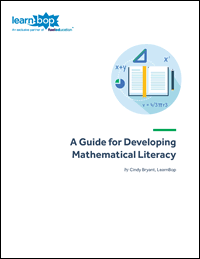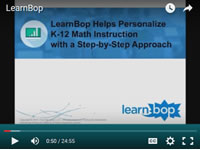From implementing the Common Core, to juggling different age groups and skill levels, to delivering high quality instruction in the face of growing class sizes, today’s K-12 math educators face an array of challenges. Many math teachers are turning to digital tools to support them in facing these challenges, but navigating the world of edtech can also be difficult and time consuming.
This site was created in partnership with eSchool News to provide high quality supplemental resources and support for math educators. We’ve worked hard to cull and in many cases create the very best resources to help you save time and deliver high quality math instruction for your students.
Boosting Teacher & Student Performance

A Guide to Developing Mathematical Literacy
Mathematical literacy is just as crucial as English literacy—let’s help our students understand!
In this short guide, we cover key concepts and resources for developing mathematical literacy including the Three Cs (Connection, Communication, and Critical Thinking), and recommendations for further resources to support your efforts in the classroom.

Effective Practices for Learning Mathematics
Teaching mathematics is a complex and creative undertaking, which is why we’ve compiled some best practices in this short guide. We highlight key concepts and resources, including creating both learner and content connections; encouraging engagement; and specific tools and links for extra support.

Field Guide to Implementing the Common Core State Standards for Mathematics (CCSSM)
Are you facing challenges with implementing the Common Core? n this short guide we tackle the three big CCSSM implementation challenges: Lack of funding; Increasing teacher content knowledge; and Finding quality curriculum materials that actually align to the CCSSM.
Math Success Stories

LearnBop Case Study – Brooklyn Students See Dramatic Improvement
A group of 50 middle school students at MS 385 in Brooklyn, NY went from a 40% pass rate on the math portion of NY’s Common Core state assessment to a 96% pass rate, using LearnBop to prepare. Download the case study to learn how these results were achieved.

LearnBop Video – Success Story at MS 385
A group of 50 middle school students at MS 385 in Brooklyn, NY went from a 40% pass rate on the math portion of NY’s Common Core state assessment to a 96% pass rate, using LearnBop to prepare. Download the case study to learn how these results were achieved. Watch the video to learn more about their story.

LearnBop White Paper – Efficacy Study
A recent efficacy study found that LearnBop helped students achieve 7-9 percentile points more growth on post-assessments in mathematics, using the system for just one hour a week. Download this white paper on the study to find out how these significant learning gains were achieved.
Insights on Math Instruction

Panel urges addition of more math content to NAEP math framework upon next revision
A new study of the math alignment between the Common Core State Standards (CCSS), adopted by most states, and the National Assessment of Educational Progress (NAEP), the longtime barometer of academic achievement among the nation’s students, found …

3-state study sheds light on math learning resource
Sixth and seventh graders saw improvements in math assessments after using LearnBop in classroom studies, company says.

How can the U.S. change math education?
Educators and experts gather to discuss the state of math education and how to keep students invested in STEM.

District Administration Solution Showcase on LearnBop
Hear how schools are closing the achievement gap in mathematics using a step-by-step approach to help personalize K-12 math instruction.

Florida district deploys new math tool
Jackson County implements LearnBop to help students master math skills, computer-based testing

Every Student Succeeds Act shifts more power to states
Much-anticipated bill attempts to satisfy all stakeholder groups as it moves away from NCLB mandates.

Will your students excel in the Innovation Age?
Catch up on the most compelling K-12 news stories you may have missed this week.

What do we really mean by risk taking in the classroom?
It’s important for students to learn risk taking skills. But how do schools do that without taking some big risks themselves?
